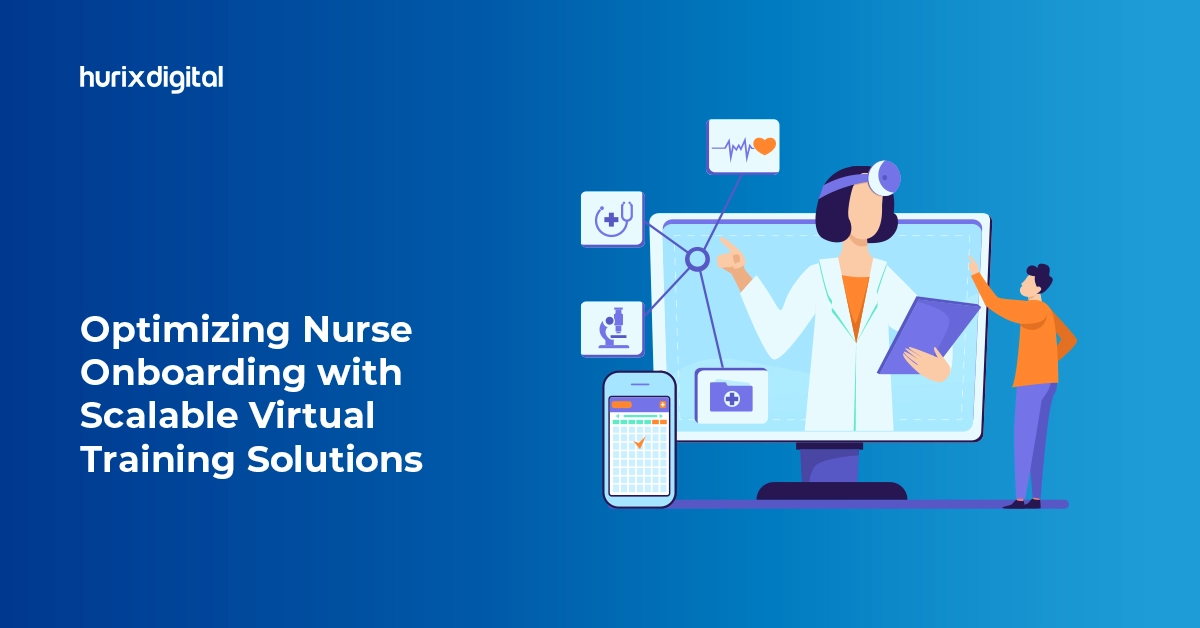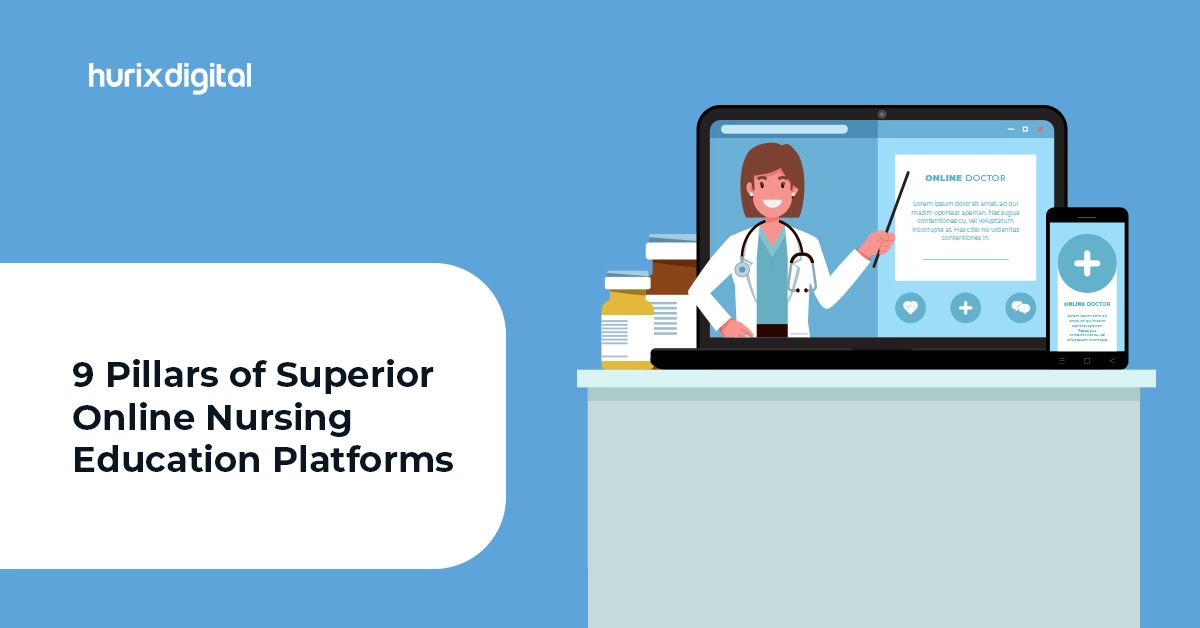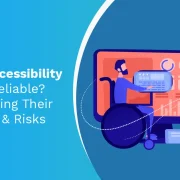
How is New Technology Fuelling the New Wave of Nursing Education?
The number of online nursing programs has increased dramatically, and many master’s programs now offer online instruction or a combination of online and classroom learning. The rapid advancement of innovative tech is driving the trend of more nursing education courses being offered online.
Technologies and online nursing degrees greatly aid the goal of increasing the number of nurses with advanced degrees and Bachelor of Science in Nursing (BSN) degrees. It is critical to comprehend new technologies and faculty experiences to integrate them effectively into the curriculum.
This article delves into the recent developments and potential future of nursing education with the onset of online programs and learning tools.
Table of Contents:
- 7 Ways Online Nursing Education Programs Have Impacted Learning
- Top 6 Benefits of Gamification in Nursing Education
- VR Applications in Nursing Education
- Benefits of VR for Nursing Education
- How is Online Nursing Education Transforming Emergency Preparedness Training?
- Things to Look for in Virtual Nursing Education Providers
- The Future of Nursing: Healthcare Education Trends in 2025
- Conclusion
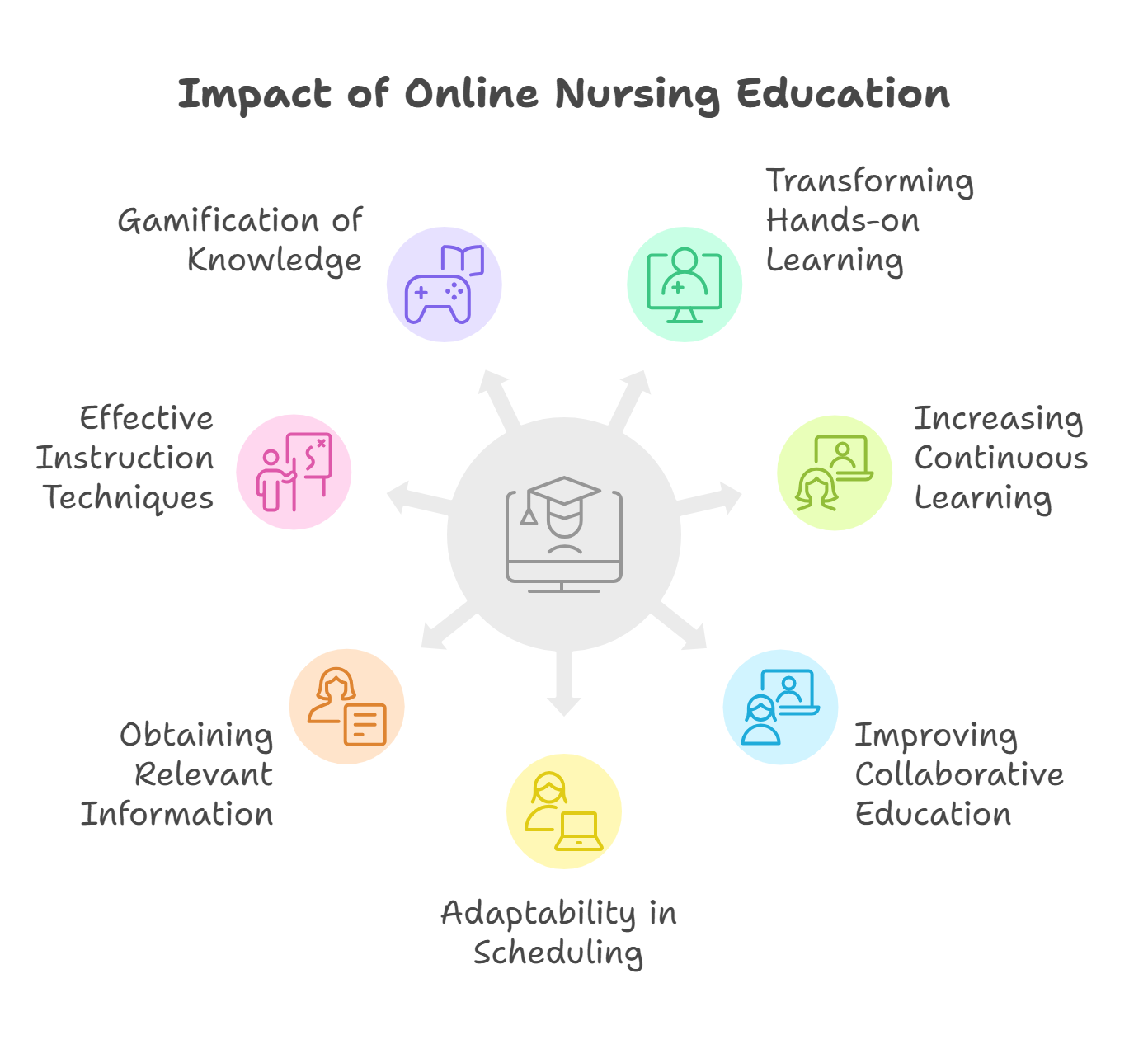
7 Ways Online Nursing Education Programs Have Impacted Learning
Virtual nursing education has varied key elements that have turned out to be effective for nursing trainees in terms of practicality, innovation, and experiential learning. Here are a few significant impacts of EdTech on nursing education:
1. Transforming Hands-on Learning
Online nursing schools are altering the game by incorporating virtual simulations and practical training into their curricula, while traditional nursing schools have always stressed the value of first-hand practical training.
Students can practice real-world scenarios and get ready for the kinds of situations they will face in the workplace by using virtual simulations. By offering a risk-free setting for trial and error, these simulations also enable students to gain knowledge from their errors without worrying about endangering actual patients.
2. Increasing Possibilities for Continuous Learning
Students can also take advantage of possibilities for continuous growth through online nursing courses and ongoing training offered by online nursing schools. By participating in these programs, practicing nurses can broaden their expertise and stay current on the latest healthcare developments.
As healthcare requirements and innovations in nursing education change, lifelong learning is increasingly essential for nurses to maintain their skill set and deliver high-quality patient care.
3. Improving Collaborative Nursing Education
Online learning is not an exception to the rule that collaborative learning is a crucial part of nursing education. Students can work with colleagues from around the globe in virtual classrooms and chat rooms, bringing a variety of perspectives and insights to the classroom.
Through social media and peer-to-peer events, online nursing schools enable students to interact with coaches, alumni, and nursing experts.
4. Adaptability in Scheduling and Location
One of the main advantages of nursing education is the flexibility of an online curriculum. Students can finish assignments and attend lectures whenever and wherever they choose when taking online courses.
As a result, many nursing students find it simpler to work and obtain practical experience while enrolled in classes. For instance, a nursing student can work as an assistant nurse in a clinic while registered in an online program.
5. Obtaining Relevant Information
The healthcare industry is always changing as a result of the frequent introduction of new techniques, treatments, and research. With the use of technology, online nursing programs can give students access to the most recent findings and materials.
Students can keep up with the latest developments and trends in healthcare by using electronic databases, online libraries, and scientifically supported tools. Online nursing education uses technology to make sure that students learn the most current, accurate, and pertinent material possible, enabling them to provide patients with high-quality care.
6. Effective Instruction Techniques
The effectiveness of educational procedures has also increased with the use of technology in online nursing education. By utilizing learning management systems and online assessment tools, instructors can effectively manage instructional resources, monitor learners’ progress, and deliver accurate feedback.
With this simplified method, teachers can customize their instruction to each pupil’s specific requirements and pinpoint areas that need more help or attention. Technology also makes it possible to deliver content that is current and supported by evidence, giving students the knowledge and abilities they need to succeed in the rapidly changing nursing field.
7. Gamification of Knowledge
Gamification involves introducing game mechanics into non-gaming environments such as websites, online communities, learning management systems, or corporate intranets to increase engagement. It aims to encourage cooperation and sharing when interacting with trainees and staff.
Gamified flipped classrooms, as opposed to traditional flipped classrooms, enhanced the determination, level of planning, expertise, and self-assurance of nursing students during their lab clinical experiences.
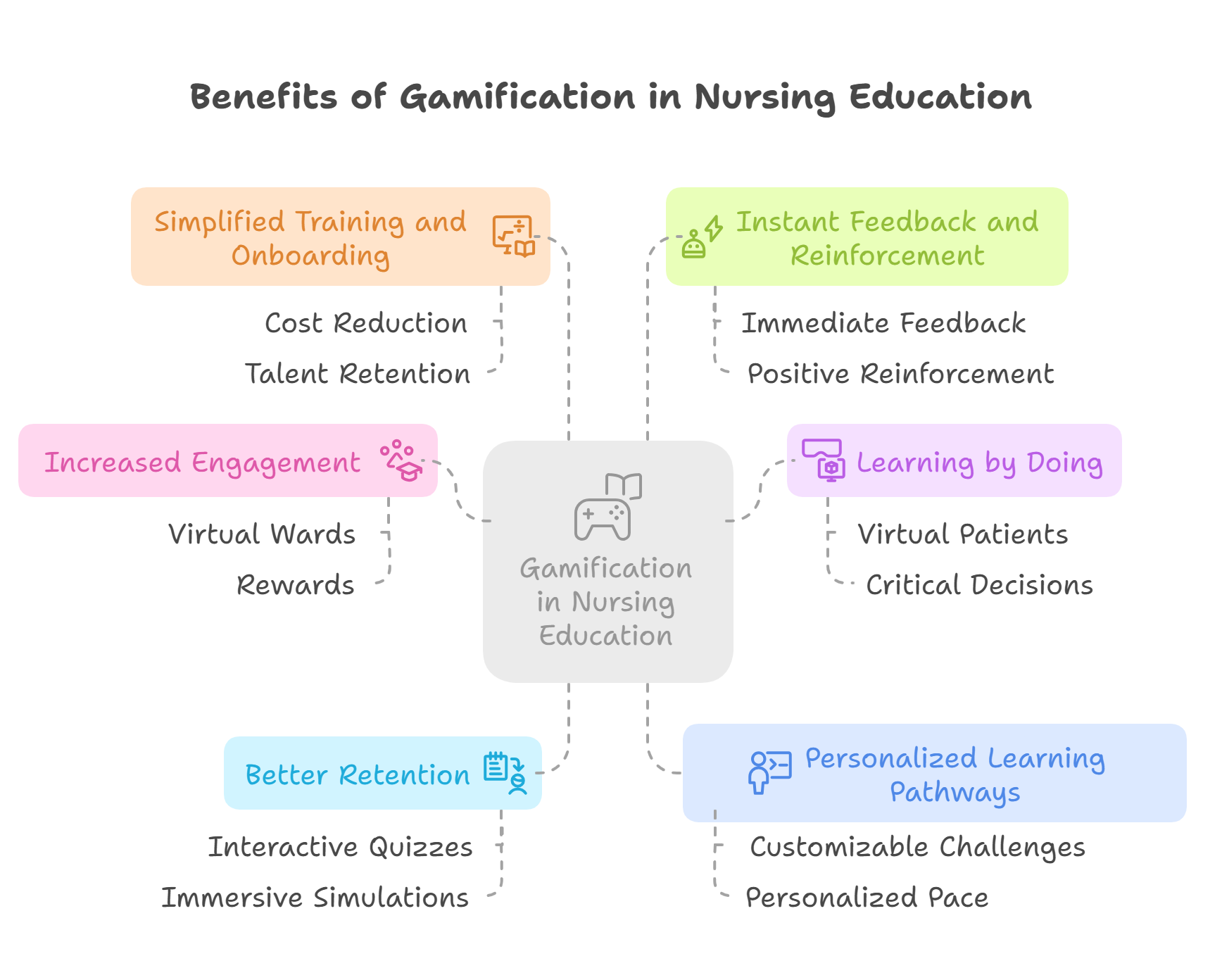
Top 6 Benefits of Gamification in Nursing Education
Gamified learning has innumerable advantages for learners. Let us explore the key benefits and delve deeper into how this innovative approach reshapes learning for the future.
1. Increased Engagement
In nursing education, traditional methods often struggle to capture student interest. Gamification solves this problem through its engaging features to boost learner motivation. It allows learners to enter virtual wards and tackle challenges head-on. They can also collect rewards for their progress.
Gamification creates an addictive experience for learners because immersive learning shows a staggering 72% increase in student motivation. Increased motivation translates to deeper engagement and focus, resulting in better-prepared nurses.
Gamification has the potential to turn boring classroom lectures into engaging lessons.
2. Learning by Doing
Rote memorization is a thing of the past because gamification opens doors to virtual wards overflowing with real-world challenges.
Gamification in education throws students into the thick of things and replaces theory with immersive simulations. It allows learners to diagnose virtual patients, navigate complex protocols, and make critical decisions in a safe virtual environment. Such a hands-on approach is fun, boosts critical thinking, and decreases anxiety.
3. Better Retention
Understanding drug interactions from mere textbooks and lectures is hard to comprehend and retain for a lifetime. However, the interactive nature of gamified nursing education offers an opportunity for engaging quizzes and immersive simulations to enhance comprehension and retention.
Using immersive means of instruction shows a 75% increase in knowledge retention compared to traditional methods. Students form deeper connections with the material and leave textbooks and lectures in the dust by actively participating in challenges.
Thus, the use of gamification to teach in nursing empowers your students to become knowledge powerhouses and improves their ability to retain information.
4. Personalized Learning Pathways
It is impossible to impart nursing education through a one-size-fits-all approach. Every learner has their own pace of picking up concepts and learning. In such a scenario, gamification steps in as a customizable learning coach that caters to the unique needs of each student.
Gamified learning enables learners to navigate virtual wards at their own speed and tackle challenges designed for their skill level. It allows you to progress to new levels and unlock fresh learning adventures in a gamified format. It also adapts to offer practice sessions and support throughout a tricky diagnosis and much more.
Gamification breaks down complex concepts into digestible quests, which makes difficult topics an engaging challenge for learners. It helps to personalize your learning journey so that you can become a master of your medical domain.
5. Simplified Training and Onboarding
A dwindling nursing workforce requires a speedy training and onboarding process.
Gamification offers the perfect solution by streamlining training processes through simulations. Its interactive and personalized nature reduces costs and speeds up onboarding. It ensures a deeper understanding and a more skilled workforce.
By making nursing education engaging, effective, and efficient, gamification has the potential to attract and retain talent while improving the quality of care delivered. Thus, it is a revolution in the sphere of healthcare.
6. Instant Feedback and Reinforcement
Awaiting exam results is the most dreaded time spent by learners. However, with gamification coming in, students get instant feedback.
Gamification injects real-time feedback into nursing education to transform learning from a slow burn to an instant gratification game. It enables learners to tackle medical situations while receiving immediate feedback on their diagnoses, allowing them to refine their skills instantly.
Gone are the days of agonizing over wrong answers because gamification corrects them instantly and allows you to learn and adapt in real-time. Gamified learning celebrates correct answers with positive reinforcement to boost motivation and solidify your knowledge. It facilitates better training, accelerates learning, and helps learners develop razor-sharp skills.
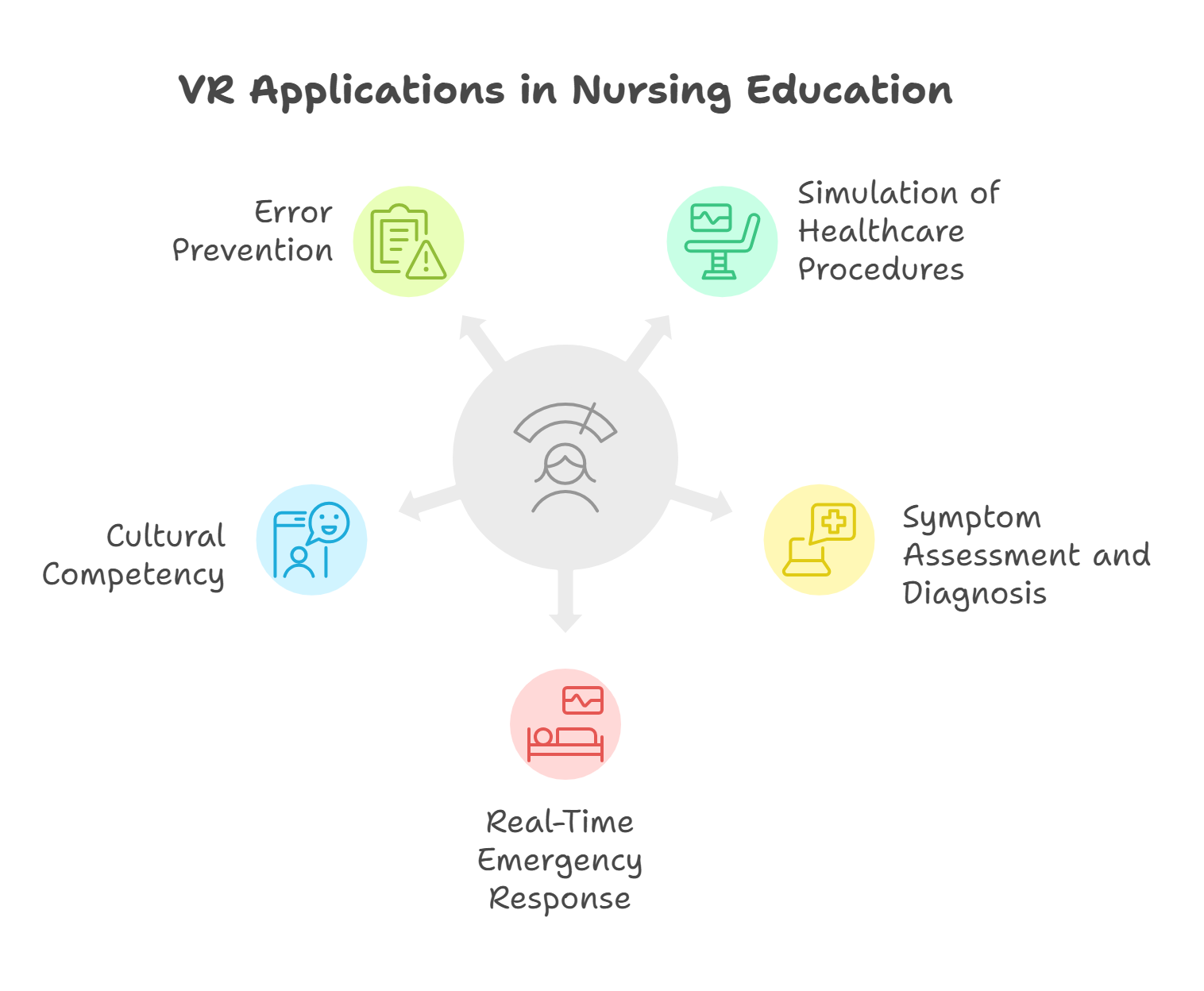
VR Applications in Nursing Education
Immersive healthcare training introduces nursing students to various patient conditions and the risks they may encounter when dealing with different healthcare scenarios. It also helps them acquire the skills required to address the issues effectively.
Here are some of the major applications of VR in nursing education:
1. Simulation of Healthcare Procedures
Virtual reality can facilitate recreating different healthcare conditions, enabling nurses to practice their repetitive patient-care skills.
When it comes to nursing education, learning to ensure patient safety assumes immense importance. Virtual simulations of medical procedures allow nursing students to get acquainted with diverse situations. This paves the way to gain hands-on experience in handling different healthcare scenarios and improve their efficiency in providing patient care.
In other words, VR allows nursing students the scope to practice their skills in a risk-free environment before handling real patients.
2. Symptom Assessment and Diagnosis
Virtual reality in nursing practice can simulate medical scenarios where nurses are required to assess symptoms, identify crucial signs, and make diagnostic decisions.
Different medical conditions require different interventions. VR provides nursing students with realistic experiences of dealing with virtual patients exhibiting different medical conditions. Thanks to this technology, students can improve their competency in symptom assessment and clinical decision-making.
By developing their ability to assess and recognize symptoms, nurses can gain confidence in prioritizing patient needs in real life.
3. Real-Time Response to Emergency Situations
VR simulations can create healthcare scenarios that demand immediate response and real-time decision-making to prioritize patient care. These can include situations like trauma incidents, cardiac arrests, serious accidents, etc.
Immersive learning in healthcare hones nursing students’ ability for prompt response by familiarizing them with such dynamic situations. Students learn to assess situations, apply their knowledge of emergency protocols, and respond in real-time to ensure patient care.
Whether fostering critical thinking skills or making effective decisions under stressful circumstances, VR and immersive learning can significantly improve outcomes.
4. Fostering Cultural Competency
VR simulations for nursing students can boost their cultural competency by creating virtual patients from diverse cultural backgrounds.
When students engage with virtual patients from different backgrounds, they learn to comprehend and address their unique needs. Such experiences offer them the opportunity to understand the perspectives of patients belonging to different cultures.
This, in turn, enhances their cultural competency and enables them to foster empathy in patient care.
5. Prevention of Errors
Risk management and error prevention are core areas of enhancing nursing training with VR. Virtual reality can create simulations focused on potential risks and errors related to patient care.
VR technology allows nursing students to identify and minimize risks, comply with safety protocols, and learn from mistakes without jeopardizing the safety of real patients.
Due to the simulations, they can learn continuously and improve their skills in risk management and the prevention of errors without compromising the safety of real patients. Such training can prepare students for the dynamic challenges in patient care and contribute to patient safety.
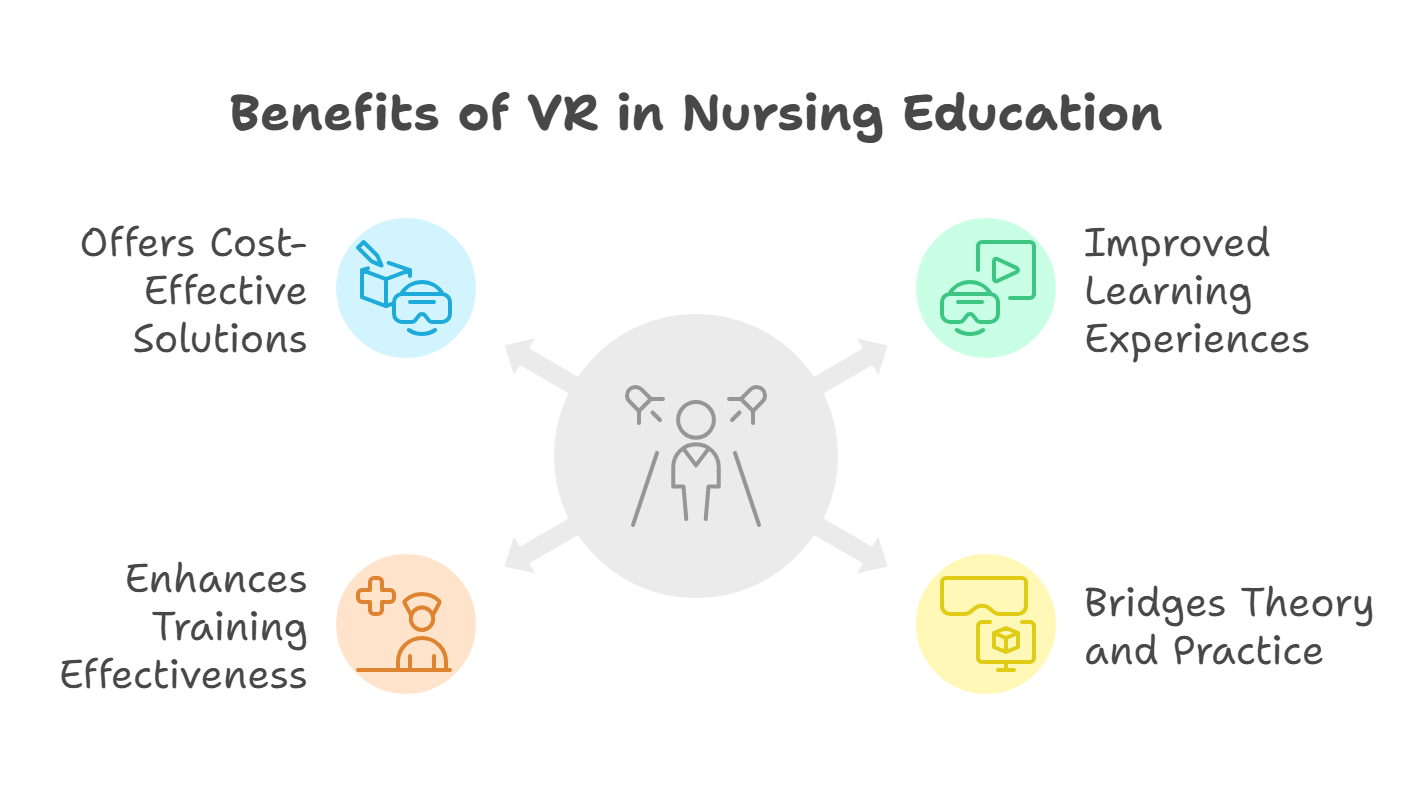
Benefits of VR for Nursing Education
Implementing VR into nursing education offers several benefits that contribute to enhanced learning outcomes. Some of the top benefits of incorporating VR in nursing education include the following:
1. Improves Learning Experiences
VR ensures highly immersive healthcare training. By offering interactive learning experiences, this innovative technology engages students and encourages them to take part in the learning process.
The realistic simulations allow students to understand complex clinical procedures and concepts smoothly, thus making it easier for them to absorb and retain knowledge.
2. Bridges the Gap between Theory and Practical Scenarios
VR simulations for nursing students help to address the challenge of closing the gap between academic knowledge and its application in the real world.
By offering immersive practical experiences, this technology enables students to apply their academic knowledge to real-world scenarios that have been created virtually. It helps students gain an enhanced comprehension of the subject matter before applying it to patient care.
3. Enhances Training Effectiveness
Virtual reality allows students to experience, understand, and practice subject matter and concepts at their own pace. Using VR simulations for repeated practice enables students to build and improve their skills effectively. Such learning experiences help them master the subject matter within a short time and with better efficiency.
4. Offers Cost-Effective Training Solutions
Healthcare training in a traditional setting usually requires the use of expensive equipment. VR technology comes across as a more affordable solution to the training needs of nursing students.
Training institutions can leverage this technology to conduct training at a much lower cost than setting up and maintaining a clinical simulation lab. Further, it enables training to be conducted remotely, thus eliminating the expenses related to attending training sessions physically.
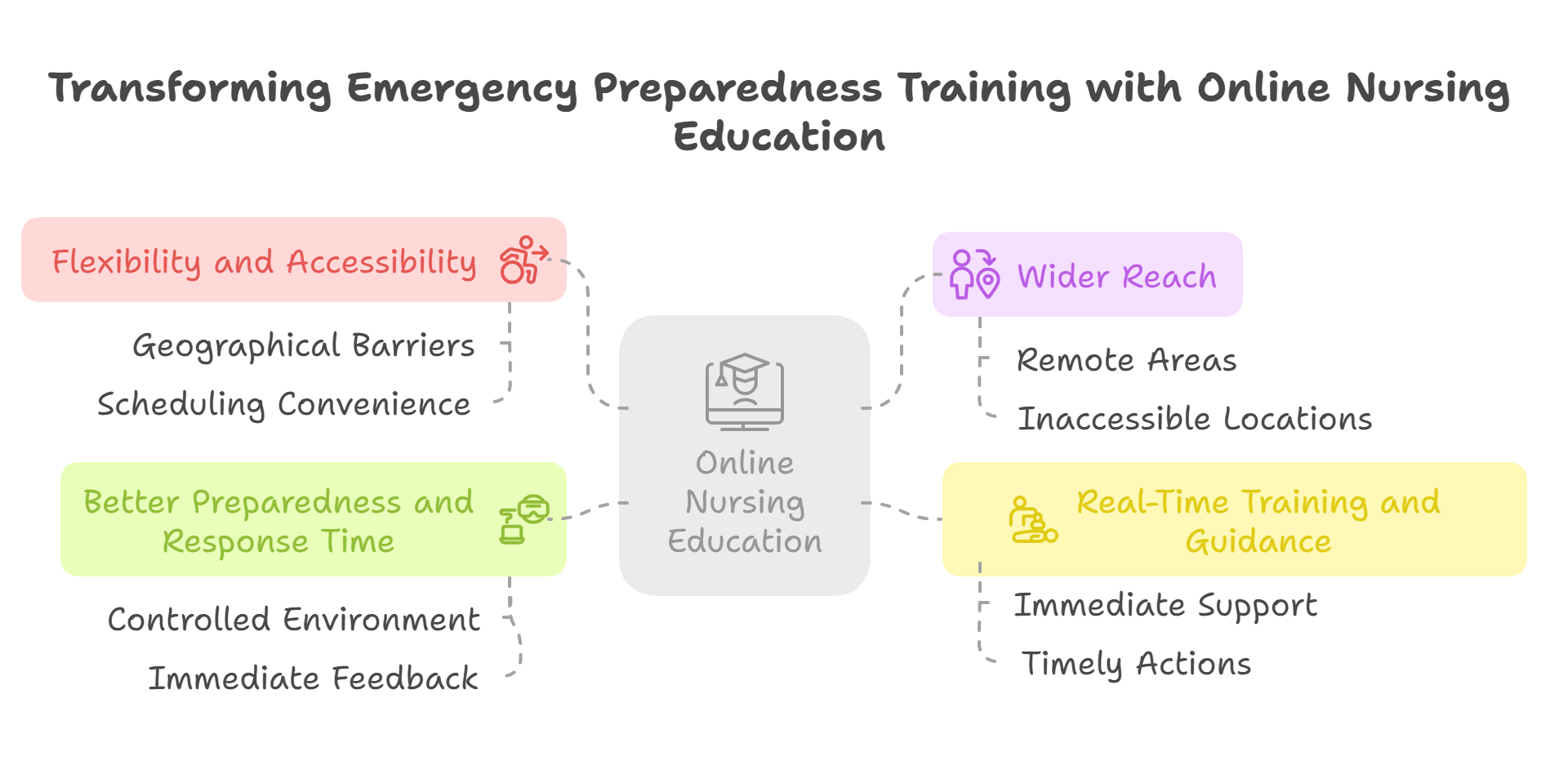
How is Online Nursing Education Transforming Emergency Preparedness Training?
Thanks to today’s technology, the healthcare space is changing at a supersonic speed. Virtual simulation training has emerged as a foundation for staying ahead and ensuring readiness during crises.
Utilizing immersive Virtual Reality (VR) and Augmented Reality (AR) technologies, nursing students can engage in lifelike scenarios to refine their skills within a controlled and low-risk environment. These innovative tools simulate hypothetical medical emergencies, empowering healthcare workers to practice critical decision-making without real-life consequences.
Remote healthcare education offers a multitude of advantages in the realm of emergency preparedness:
1. Flexibility and Accessibility
Virtual nursing education breaks geographical barriers, making emergency preparedness training resources accessible to anyone with a computer or smartphone.
Additionally, with virtual training modules, nursing trainees can schedule educational resources at their convenience. This ensures that healthcare professionals—including nurses, doctors, and paramedical workers—can train without disrupting their work-life balance.
2. Wider Reach
Many healthcare workers are deployed in remote or inaccessible areas. With traditional nursing education, reaching out to these areas can be a problem. But not when you adopt virtual simulation training modules.
Online nursing education allows you to quickly reach a wider audience, irrespective of their geographical location.
3. Real-Time Training and Guidance
During a medical emergency, every second counts. With virtual nursing education, healthcare professionals can easily get access to real-time guidance during an emergency. This enables them to take quick and timely actions, thus preventing complications and saving lives.
4. Better Preparedness and Response Time
Virtual simulation training allows healthcare workers to practice emergency response techniques in a controlled environment. As a result, the learners can experiment with different things, identify their mistakes, and receive immediate feedback. Such a supportive learning environment promotes confidence and competence to deal with any emergency.
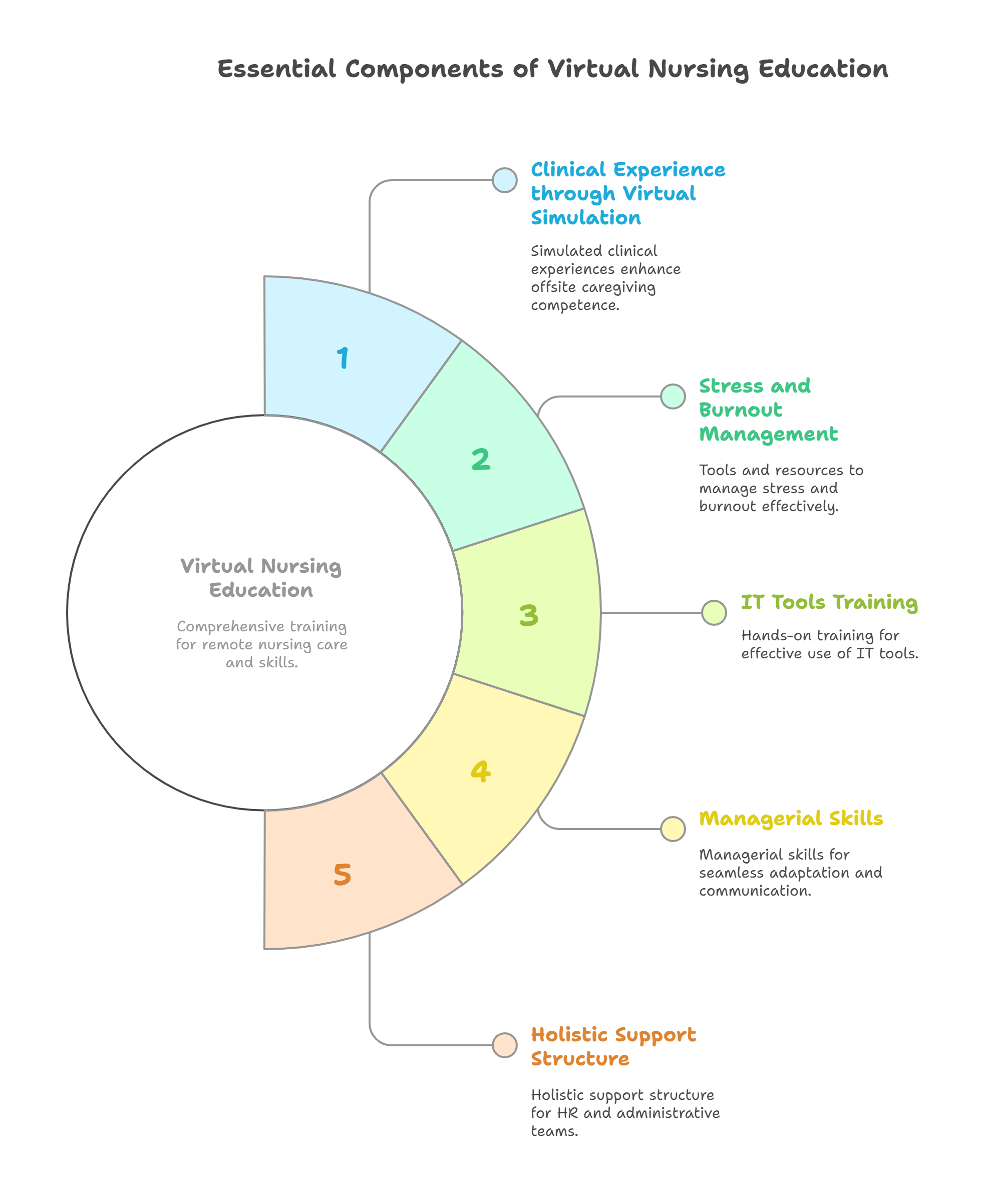
Things to Look for in Virtual Nursing Education Providers
Videoconferencing technology is the foundation of virtual nursing. It allows nurses to work from remote locations. They can conduct admission interviews, observe patients, offer satisfactory answers to patients’ or their family members’ queries, spell out discharge modalities, and carry out tasks that don’t require physical closeness. This eases the pressure on bedside nurses.
Suppose you plan to enroll in online nursing programs that include virtual nursing education or want to expose your nurses to training. In that case, you need to check if the educator offers the following:
1. Clinical Experience through Virtual Simulation
Your educator must train you on good nursing simulation software to enrich your offsite caregiving competence. This will build your confidence through simulated clinical experiences.
A good simulator designed to impart distance learning for nurses should have certain characteristics, like:
- Authored by veteran nurses
- Learning chapters inspired by real-life nursing scenarios
- Interactive and adaptive simulations that can promote self-paced learning
- Provision for personalized feedback with the ability to customize learning modules based on identified shortcomings for individual students
- Option for practicing with diverse patient cases through high-fidelity simulators to measure the efficacy of decision-making and clinical reasoning skills
- Ability to choose from varied patient cases that can complement the learning nurses’ evolving skill development requirements
- Capability to access realistic clinical scenarios online anywhere, anytime
- The presence of yardsticks that critically analyze and measure the progress of learners on tangible cornerstones
- Delivery of quick, precise, and personalized remediation for identified weaknesses in the learning roadmap
- Expand the learning scope intuitively to accommodate changes in the nursing landscape
The immersive experience offered by simulators would sufficiently reinforce caregiving skills even without interacting with real patients. The virtual nursing education technology equips you with insights and proficiencies needed to transition to practice seamlessly.
2. Lessons on Managing Stress and Burnout
Virtual nurses will have to confront psychological demands more. This will take a toll on their mental health. Your educator must offer an overview of numerous sources of stress that you may encounter during a shift.
Further, the educator must offer tools and resources to tackle workplace challenges with the right mindset. This implies access to tools and mind-calming techniques that can make you more agile in striking the right balance between life and work. After completing the program, you should feel armed with tactics to handle stress-related burnout effectively.
3. Hands-On Training for Handling IT Tools
Virtual nursing’s success depends on how well the nurse can focus on the patients from a remote location and discern their discomfort or requirements. This implies that the educator must offer prospective nurses hands-on training on handling video conferencing tools and other audiovisual aids effectively.
You must ensure the educator has enough state-of-the-art IT resources to offer comprehensive training on contemporary software. After undergoing the training, a nurse should be able to perform activities like:
- Zoom the camera of the laptop or transmission device to observe patients, readings of monitoring equipment, and medication data closely
- Pan the camera through the patient’s room or ward to have a clear vision of the ambiance or atmospheric elements
- Convey medication or care details to the patients without relying on support from bedside nurses
- Communicate remotely with different stakeholders like other nurses, doctors, interpreters, etc., and offer consultation accurately
- Configure EMR (Electronic Medical Record) of patients by giving directions to the person updating the respective patient’s history
4. Incorporation of Managerial Skills
Virtual clinical experiences are not restricted merely to looking after patients from a distant location. A virtual nurse must be adept at doing many incidental things that can directly or tacitly impact the outcome of the caregiving process. The educator with whom you would partner must impart some managerial skills to the virtual nurses.
These would primarily include:
- The ability to manage change on the part of nurses and seamlessly adapt to new situations quickly
- The capability of offering qualitative feedback and suggestions to fine-tune and improve the caregiving exercise
- The flair for communicating precisely and adequately with the onsite nursing team and engaging in meaningful dialogues about patients’ comfort levels and needs
- The art of interacting discreetly with patients or their relatives without exciting their dread or anxiety quotients by bluntly divulging inappropriate details
- The inclination to collaborate with remote nurses, work in synergy, and defuse conflict situations
- The knack to focus exclusively on the KPIs (Key Performance Indicators) or things that the virtual nurse would be responsible for to reduce confusion
- The ability to convey challenges, support requirements, and technology infrastructure deficiencies to the IT team to secure timely help
5. Insights into Holistic Support Structure
Hospitals, too, are increasingly filling vacancies for remote nurses. As a hospital administrator, you can subject your HR team to a few lessons from the education partner offering accredited online nursing courses.
The purpose of such training would be to make the HR or administrative team aware of
- The nuances of roping in remote nurses in a professional space traditionally dominated by bedside nurses
- The strategies to adopt for recruiting remote nurses and skills to look for in prospective candidates
- The requirements or responsibilities that virtual nurses have to fulfill
- The metrics to decide the professional tenure of remote nurses and shape the hybrid profile of nurses willing to work both as bedside and virtual caregivers
- The parameters to ascertain the nurses’ satisfaction levels and device retention policies
This training is important because the aging fleet of present nurses is posing a challenge for health service providers. In the USA alone, the median age of nurses is 52, and 4.7 million nurses are expected to bow out by 2030.
The Future of Nursing: Healthcare Education Trends in 2025
Future developments in technology will have a profound impact on the nursing profession. Some of the predicted innovations in nursing education are expected to be an outcome of
- Advancements in telehealth
- AI and data analytics
- Wearable devices
- Automation tools
- Virtual and augmented reality
- Communication platforms
- Personalized medicine
The application of technology in nursing practice enhances societal welfare because it reduces healthcare expenses while increasing self-management capabilities for patients and improving healthcare results and it increases medical research potential disease prevention efforts and health education outreach.
Conclusion
While no emergency contingency plan is foolproof, creating a learning culture from past mistakes can help the healthcare sector become more proactive. Nursing education plays a pivotal role in effective emergency preparedness training. Innovative technology can engage students through experiential learning. By transforming the learning process for nursing students, it can facilitate enhanced learning outcomes and improved patient care.
Trusted partners like Hurix Digital can tailor experiences and learning programs that address traditional training roadblocks and resonate with your unique context.
You can seamlessly integrate engaging simulations, personalized learning pathways, and interactive feedback loops into your curriculum through its cloud-based learning management solutions and expert design team. Their best-in-class technology and expertise can help you unleash the full potential of gamified nursing education.

Senior Vice President
A Business Development professional with >20 years of experience with strong capability to sell new solutions and develop new markets from scratch. New Market Entry Specialist with experience working in the largest emerging markets. Exceptional experience in conceptualizing, ideating and selling new learning technologies like VR AR, etc. across multiple industry verticals.


